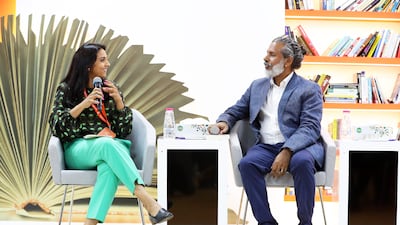The Booker Prize-winning author Shehan Karunatilaka has lamented the state of Sri Lanka today after natural disasters, poor economic management and political failure pushed his island nation home to the brink of collapse.
Speaking to The National at the Sharjah International Book Fair, Karunatilaka, 47, said the peril his nation faced quickly vanished from the headlines shortly after protests caused the last government to fall in July.
“We have had a tsunami, we've had the Easter attacks, we have an economic collapse,” he said.
“It is just that I have lived in Sri Lanka for over 40 years, and we've had so many false dawns.”
A cost of living crisis, medicine shortages and the continuing lack of foreign currency to import goods threatens to leave millions starving, the UN said this week.
On Monday, President Ranil Wickremesinghe set out his first budget since taking office in an attempt to turn around the economy by late 2023.
Karunatilaka's book The Seven Moons of Maali Almeida, set in war-torn Sri Lanka in the late 1980s, centres on a dead war photographer who has seven days to solve his own murder. It won the Booker Prize in October.
Living in a country that has suffered an unrelenting cycle of unrest, violence and natural disasters, he said there is no dearth of stories in Sri Lanka.
“I understand, apart from cricket, or tea, we are not on the world map. Sri Lanka is not on most people's radar,” Karunatilaka said on the final day of the book fair on Sunday.
Though the novel was first published in 2020 under the title Chats with the Dead by Indian publisher Penguin, the author said the book “really struggled elsewhere”, especially in the West.
“When you are writing in Colombo as a Sri Lankan writer about a Sri Lankan conflict, you don't take really expect that someone in Missouri or Paris is going to read this stuff,” he said.
The book was later published by independent UK publisher Sort of Books as a new draft.
Sharing an experience earlier in the year when he was attending a writer’s forum at the UN along with other literary heavyweights, Karunatilaka said he was surprised when Sri Lanka did not even get a mention at a time when the country was imploding with mass protests and political unrest that began in April.
“All these eminent writers … they were all talking about Ukraine, Palestine, climate crisis, ISIS, all these things. And I was waiting and waiting. No one was mentioning Sri Lanka,” he said.
The author said he had to jump in and remind the audience that “Sri Lanka is not on the news, but significant stuff is happening there”.
Continued unrest
In July, protesters stormed President Gotabaya Rajapaksa’s official residence in Colombo and set fire to the private residence of Mr Wickremesinghe, who was then prime minister, amid months of mounting public anger.
Images of protesters jumping in the palace’s swimming pool and watching cricket from the PM’s living room went viral.
But for Karunatilaka, who grew up in Colombo, the protests were also a show of the power of the written word in uniting people.
“The power of the written word is not in novels, it is in Twitter, on Facebook, on TikTok even. Sometimes, those things can bring down governments and effect change,“ he said.
“It was old people, young people across the races … people were just coming out there and doing this.
“We are a tiny country, but I thought there were lessons there.”
In 2009, when he started writing his book at the end of the two decade-long civil war in Sri Lanka that claimed an estimated 80,000 lives, the author said there was hope it could become a great nation again.
“And then 10 years later, we again find ourselves here,” he said.
But he still remains optimistic that the younger generation of leaders and activists will turn a new page on the country’s grim past.
“There is more gender equality. And all these racial ideas are not there as much any more. That is optimistic,” Karunatilaka said.
































